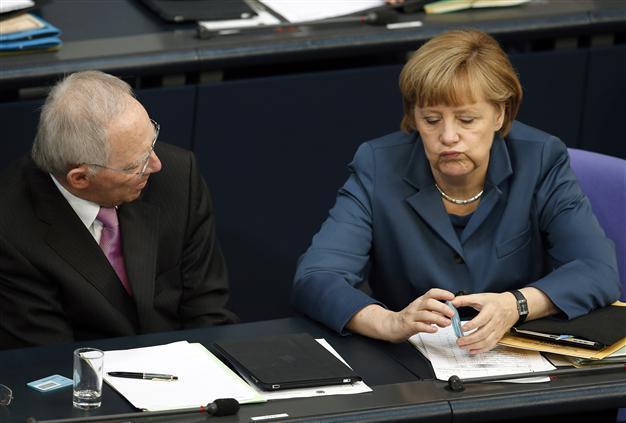German parliament approves Cyprus aid
BERLIN - Agence France-Presse

German Chancellor Angela Merkel, right, and German Finance Minister Wolfgang Schaeuble, left, react during a meeting of the German federal parliament, Bundestag, in Berlin, Germany, Thursday, April 18, 2013. AP photo
The German parliament approved an international bailout package for stricken eurozone member Cyprus by a large majority on Thursday.In the Bundestag lower house, 486 deputies voted for the measure with 104 against and three abstentions.
MPs also overwhelmingly backed a deal by eurozone finance ministers giving Ireland and Portugal an extra seven years to repay aid they have received to allow them to consolidate progress.
Eurozone finance ministers formally approved on Friday new terms for the Cyprus debt rescue that will cost far more than first thought -- 23 billion euros ($30 billion) rather than 17 billion euros.
Eurozone partners and the International Monetary Fund are to provide 10 billion euros of this amount while the Cypriot government will have to find the rest.
Germany will kick in about one-third of the international assistance.
The debt rescue involves a radical restructuring of Cyprus's bloated banking sector, with an economy heavily dependent on financial services now expected to shrink by up to 12.5 percent over the next two years.
Finance Minister Wolfgang Schaeuble had urged MPs to back the Cyprus bailout, citing the gradual recovery of other stricken eurozone members as evidence the aid-for-reforms strategy worked.
Speaking to the Bundestag, he said that countries such as Portugal and Ireland had shown that tough budget cutting coupled with international assistance could save a debt-mired country.
"Both have undertaken enormous efforts, are fulfilling the requirements of their (rescue) programmes and are on the right track," he said.
Schaeuble also noted substantial progress made in the last three years in taming the eurozone crisis, with economic progress such as a hike in exports from southern European countries as well as a sharp drop in public deficits. Striking a conciliatory note, the usually tough-talking Schaeuble noted that Germany's preaching of austerity in Europe sometimes lacked compassion for the sacrifices made by the people of crisis-battered countries.
"In our country in particular where the euro crisis is not felt in everyday life we must issue a reminder that the people in Greece, Portugal and Cyprus are going through tough times," he said.
But he stressed there was "no other way" than fiscal discipline to achieve sustainable long-term stability and growth.
Polls show that Germans strongly back the crisis-fighting strategies of Chancellor Angela Merkel and her fellow conservative Schaeuble, with five months to go until a general election.
















